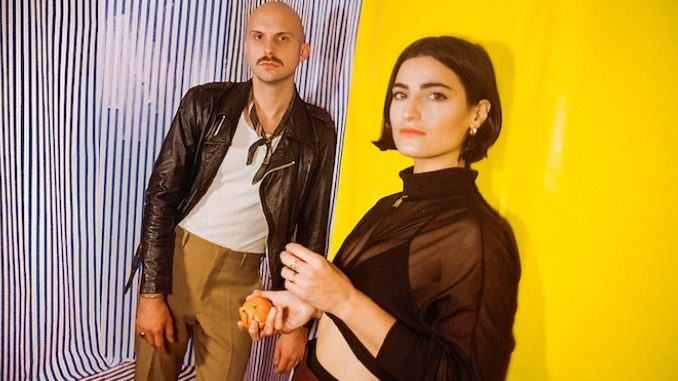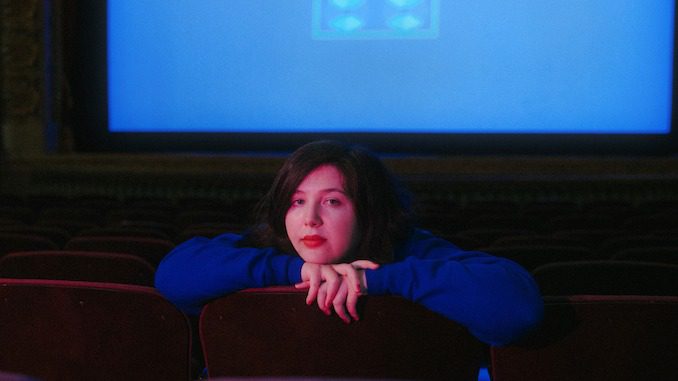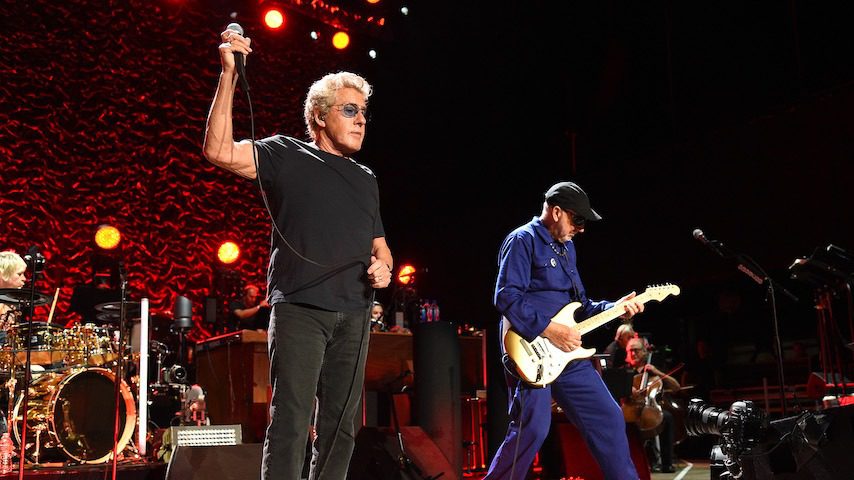Writing a fan letter to your favorite movie star seems so 20th-century passé these days. And pining about your matinee idol via hi-tech platforms like Twitter and Instagram can feel cold and impersonal, despite the bandwidth immediacy. So Mattiel Brown— the gale-force frontwoman for Mattiel, the awesome alt-rock duo she maintains with fellow Georgian, guitarist/producer Jonah Swilley—chose another way to pay good-natured tribute to her longtime cinematic crush. She wrote a song about him, indirectly, the punchy pop-punker “Jeff Goldblum,” in which a paramour sweeps her off her feet in the same she imagines that the sardonic Jurassic Park actor would; the single opens Mattiel’s latest panoramic full-lengther, the aptly- dubbed Georgia Gothic, which for the first time softens her customary bullhorn vocals with Swilley’s increasingly mausoleum-reverb tones.
Naturally, the tandem “Jeff Goldblum” video is cult-film campy, incorporating quirky old clips from Goldblum’s early Buckaroo Banzai era, revolving around snippets from Earth Girls Are Easy. And Brown isn’t kidding. She’s always idolized the angular, quick-witted thespian, and she’ll defend almost all of his performances, and the more obscure, the better. “I had three people tell me, ‘Don’t bother to watch Earth Girls Are Easy—it is sooo bad!’,” the Atlanta-based singer growls, defensively. “But I watched it anyway, and I was like, ‘Yeah!’ It’s like B-movie bad, but it’s an incredible feat of prop engineering and special effects from that time because the sets on that film are way too good for the film itself, which is hilarious to me.”
Brown has yet to meet Goldblum. “I don’t think I’ve ever met a famous actor before,’ she sighs, although her experience of being taken under the touring wing of Jack White she recalls as being quite pleasant. And she has a keen sense of humor, evident in the Mattiel logo, a slight variation on the toy company Mattel’s, and the playful Grant-Wood-spoofing cover art, featuring her and Swilley in cheesy Satanic costumes brandishing pitchforks. But there’s a serious side to her too. It is perhaps etched in stone by her horrific health scare a few years ago when she accidentally became addicted to steroid cream and finally shook the beast after over two years of oatmeal-bath therapy (she’s feeling fine now, she reports”I don’t even know how to talk about it now — it was so awful, I’d blocked most of it out.”).
After a barnstorming sophomore set, Satis Factory, the band’s attendant victory-lap tour was, alas, cut short by the coronavirus. Yet Mattiel managed to release two limited-edition vinyl singles, 2020’s Double Covers boasting Brown raising the roof on piledriving versions of The Clash’s “Guns of Brixton” and The Beastie Boys’ “Looking Down the Barrel of a Gun” and last year’s Those Words (with a bouncing New Wave-retro title track — one of the duo’s best). When Brown and Swilley finally reconvened after lockdown was lifted, they retreated to a spooky old cabin in upstate Georgia, far from the madding crowd, and whittled out most of Georgia Gothic—from shadowy lurkers like “On the Run” to the Billy-Preston funky hip-shakers “Other Plans” and “Cultural Criminal” and a blues-stomping, choir-lofted coda, “How it Ends.”
For now, Brown is content with “Jeff Goldblum” as the current calling card for Mattiel’s return. Will she meet him one day, or won’t she? She chuckles softly. “Hey— I’d love to hear from him, but either way is fine by me,” she decides. “But I just hope he thinks the song is cool!”
Paste: So this rural Georgia cabin you two disappeared into looms large in the Georgia Gothic legend. How did you find it?
Mattiel Brown: We can’t tell you that information! No, we were there for a week and that’s where the record was born> But how did we find it, Jonah?
Jonah Swilley: Oh, we paid somebody to go there — it wasn’t very undercover. It was more just business as usual. I do that all the time. Y’all don’t do that? Me and my friends rent out cabins all the time. And that’s part of the fun—to be kind of scared when you’re there.
Brown: There’s a lot of them in Northern Georgia. And you’ve gotta go buy some firewood and walk around in a place where nobody wears any masks. It was out there. And I brought a bunch of pasta and salad.
Swilley: Yeah. We brought all of our own food and stuff. We didn’t resort to the local shops or anything.
Brown: Nor did we go out and kill our own game. But I felt pretty happy there, to be away from everything. It was really nice. And we had an outdoor fire, a fire pit. And we just started working as soon as we got there. Jonah started writing, then I would sort of wait for a song structure from Jonah, and then I would write.
Swilley: And I think we were really pent up, too, creatively. We just hadn’t written anything in a while, so we saved up all of our creative juices for the cabin trip. So by the time we got there, we already had ideas, flowing in our heads, I think. We hadn’t seen each other. We were so rule-abiding that we just stayed in our houses (during lockdown), and we were basically just talking like, “Well, whenever we see each other again, we’ll be able to make some more music.” And it felt very dismal, the idea of trying to make more new stuff.
Brown: Yeah. Those were very uncertain times. And nobody was asking us to make the record. But we finally just had the time, and we weren’t on tour because everything got canceled, soooo….we used that time to our advantage, I guess. And there was definitely a lot in the subconscious that kind of came out at that time, so we were very ready to do that.
Paste: Before that, how did you spend an average pandemic day?
Brown: I taught myself how to make sourdough bread, and I was cooking a lot. That’s mostly what I was doing—I was learning new things in the kitchen, and I was having a really nice time doing that.
Swilley: I remember that I have a bodega-kind-of-gas station across the street from me, and I just remember for the first couple of weeks thinking of it as a long snow day. So me and my girlfriend—now wife—would just hang out, and we really leaned into that time that we had together because up until then I had been on the road for the majority of our relationship. So it was kind of just us, leaning into the angst.
Paste: What islands of sanity did you find?
Brown: We did trivia with a whole group of our friends. Every week, for a long time. For many months, we did it every week.
Swilley: Yeah. Everybody would stay at their own house, and then each couple—or person—would take over the game for a week and then tally it all up. It was very official—it felt very game-show-esque. Originally, we even had prizes in mind, but I don’t think we ever really fleshed that out.
Brown: Every couple would choose their own subject matter, so some couples would do sports and history and things like that, and some would do art history and pop art. Usually, with my boyfriend and I, we would do art history or Egyptian history, or something equally nerdy.
Swilley: Mine were more like snacks and different hip-hop labels. Between me and my now-wife, we’re pretty much connoisseurs of the snack game, and it’s a pretty serious lifestyle. We like Japanese snacks, and stuff that’s really hard to find, outside of a Korean farmer’s market.
Paste: And most Asian snacks come with a free action figure.
Swilley: Yeah! And it’s exciting! It makes you really excited to eat the snack!
Paste: Given your trivia focus, Mattiel, do you yourself paint? Or are you a fine artist in any way?
Brown: I would say yes, I am. I wasn’t making paintings during lockdown, though—I was making linocut, sort of rubber-stamp-cut prints, and I’ve been making them as often as I can up until this point. It’s like a woodcut, but not wood, because woodcuts are harder to do and more jagged. It’s like a little rubber block that you carve out, and then you roll ink onto it. I’ve probably made 15 prints by now.
Swilley: And for me, it was kind of fortunate that I had the time to have a studio space because normally, I would’ve been on the road or doing other things to make money. But a friend of mine offered me a space to work out of, and that was a few months into the pandemic. I was working out of my apartment, so then I got to explore different production techniques, and recording techniques, and learn a lot about what I wanted to accomplish in the studio. And it was like a very transformative experience for me, I think, just because I’d never had my own studio as a devoted location. I was able to make it into a space that I was able to create in and make things that that I wouldn’t have made in the comfort of where me and my wife have dinner, you know? I’d be making music out of my apartment while my lady was making coffee, and that was cool. But it reached a certain point where I wasn’t able to fully immerse myself into the creative processes, for whatever reason. But having a place of my own, with my amp and guitar, I could get to a place where I actually felt like I was into the music I was making.
Paste: And this was once a dialysis clinic, right? Were there any spooky vibes?
Brown: It was very weird.
Swilley: Yeah. It did feel weird at first because initially, it was empty. When I first looked at it, a rat was on the floor, and it was just kind of…squashed flat. There was really weird stuff like that. It was just a grimy place. But my buddy George Long, who’s an incredible visual artist out of Atlanta, offered the space to me, and by the time we left the building, it was this amazing multi-purpose zone. There was graffiti, and a screen-printing T-shirt operation in there. And it felt great to be a part of this weirdo, subculture thing because now the building has been sold, so it no longer exists. But it was cool to be a part of it while it lasted.
Brown: Yeah. There was something really magical about the space itself that this record was recorded in. And because it doesn’t exist anymore, it will never be there again. So eventually, we did have to get out. We spent a long time in there doing some really great work.
Paste: Even before you hear its eerie Ennio Morricone guitar work, one track kind of creeps you out in title alone—“Blood In the Yolk.”
Brown: I shouldn’t say it’s my favorite, but I love that song. Jonah wrote this thing, and I was having a really hard time writing to it. And I was very frustrated because I couldn’t come up with what I wanted to come up with. But he encouraged me to keep going. And he cut off a little piece of a THC gummy for me, and I ate it, and that helped a lot. Then ‘Blood In The Yolk’ was born, and it turned out to be something that we both love a lot.
Swilley: For our very first album, we were definitely in a spaghetti Western kind of vibe. But with this circular chord progression, I was intentionally trying to make it more of a music-box-sounding thing. And it was fun writing it because I like stuff that makes me kind of creeped out—it’s like Morricone meets Tim Burton, you know?
Paste: “On the Run” conjures up the late Jimmy Wilsey’s tones in a vintage David Lynch film. Coupled with its lyrics of carrying a “ton and a half” weight on your back and being always on the run.
Brown: I remember what the environment was like when that song was written. We were in the dialysis center when we wrote that one, actually. That’s one of the few that wasn’t from sitting in the cabin, and I think we were just trying to keep pushing. And I love that one, and the chorus—I don’t get tired of listening to it.
Paste: And “Wheels Fall Off” is kind of a showcase for Jonah, rumbling along on these big, buzzing guitar leads.
Swilley: Yeah. And that’s kind of the recurring theme throughout the music, definitely that fuzz. I mean, my favorite guitar tones come from West Africa, where all of the weird guitar fuzz is right in your face. I like that stuff a lot, and I was trying to make my guitar do that.
Paste: In the sinister “Subterranean Shut-In Blues,” Mattiel warns listeners, “Don’t touch it!”
Brown: Yeah I found all these weird parallels to “Subterranean Homesick Blues,” in its lyricism versus the pandemic situation. And it was a weird connection that I made in my head, so I kind of took those words and jumbled them up into something else. But it’s not all despair, and it’s not all negativity. And if there’s anything I’ve learned, going through the pandemic, I spent most of it pretty cynical and upset about everything. I thought by the end of it—well, not the end, because it’s kind of endemic, I guess—but coming out of it, up until this point, despair is like-you get tired of it. Your brain gets tired of being sad after a while, and you try to find a positive aspect to everything, even if it seems like a pretty sad situation. There’s always something good.
Paste: And there’s a strong Southern Gothic/Flannery O’Connor feel to some of the material here.
Brown: Yeah. I mean, we’re from the South. We both grew up in Georgia, and that Gothic imagery comes from all over. And Southern Gothic is just one genre of literature—there’s also Edgar Allan Poe, For Whom the Bell Tolls. All of that Southern vibe got me going on the subject matter and the conceptual part of the album. I dunno if I was reading a lot, but my memory of what I had read before came together with the whole weight of the record and the vibe of being up there in the cabin.
Paste: Both of you seem to function under dark, trying circumstances.
Swilley:Yeah. I think both of us are really good at taking challenges as new reasons to work harder, to try to make something really, really good. And personally? I have to do that, because if I’m not constantly making something, I get very sad and depressed. I really need to be doing something creative.




